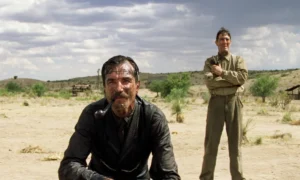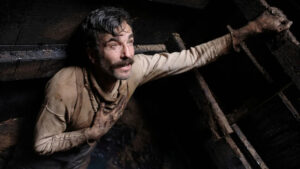Publication Date: 10-08-2025
There Will Be Blood (2007) review
Dir. Paul Thomas Anderson
By: Steve Pulaski
Rating: ★★★½
The opening scene of Paul Thomas Anderson’s There Will Be Blood focuses on rebelling against the conventions of verbocentrism, which places dialog and conversation in the forefront of what is occurring on screen. As a result, it places most of its emphasis on the delightful musicality of the environment into which we are plunged. We get a heavily detailed depiction of sound pertinent to the location, such as the repeated hacking of a pickaxe, the digging and mining of the thick dirt on the land, and the liberal amounts of atmospheric tension achieved through a focus on sporadic sounds. The effect is minimalist and unsettling, as we, the audience, are somewhat used to information dumps in the openings of films, where we’re given background information on characters and situations. There Will Be Blood focuses on the sounds of this region and, in turn, creates a decided emphasis on brief sounds that interject themselves in the mix of long term silence.
The film revolves around Daniel Plainview (Daniel Day-Lewis), an ambitious prospector at the turn of the 1900’s, working to turn a small Californian village into an industrialized boomtown by constructing an enormous and profitable oil rig to assure financial security for him and his young boy. The only soul that somewhat stands in his way for making that a reality is Eli Sunday (Paul Dano), who owns the land in the location of which he is mining in. Eli is a theatrical pastor for a church, where he is renowned in the community for extracting the devil from the souls of people and adhering to the traditionalist, often radical, beliefs of the townsfolk.

Because the characters of Daniel and Eli are often very thinly developed, known only by the descriptions of a select few adjectives, one is more inclined to view them allegorically than as characters, even though we spend over two and a half hours with them. There Will Be Blood largely positions itself to be a big parable on the prolonged result of greed and self-interest in American capitalist business, a certain pessimistic inevitability, as this film views it as. In that case, Daniel is clearly representative of the greed side where he’ll do anything to make a quick buck, as many of us, ourselves, can perhaps recall doing. His desperation is almost cloaked because of his unbridled ambition and persistency, even when almost irreparable drawbacks come in his way, such as a catastrophic explosion of one of his oil rigs.
With that, Eli comes with the dual side of the capitalist business, which is religion or morality, specifically personal integrity. Whether or not Eli, himself, is an ethical and honest pastor is moot; he represents the morally just, ethical, and fair part many capitalist businessmen claim to incorporate in their business decisions, though the end result results in largely questionable accounts for how much ethics played apart into such a decision. Throughout the film, the two sides pose an intriguing dichotomy that, in turn, makes up the larger part of American business – the constant struggle to remain profitable, ambitious, and ever-changing whilst choosing to stick to, or simply refuse, the guidance via a moral compass.
Moreover, Anderson, and the immensely talented crew in the sound editing department, clearly present themselves as a fan of layered sound, juggling various audiotracks at once. This, in turn, provides the audience with a cacophony to go along with the visual decadence. Two particular scenes showcase this: the first involves Daniel Plainview meeting a great deal of people upon exiting a train. During this scene, we get various diegetic forms of sound, such as Daniel’s conversations with the people he meets in addition to the rumbling and thumping of the train on the tracks and the roar of its industrial engine. With that, simple but fitting orchestration fills the background, though it’s careful not to over embellish the bustle of the environment nor the importance of Daniel’s dialog.

A similar scene takes place when Daniel unveils the new and elaborate oil rigging system before the town. As he speaks of the system, the same kind of orchestration sings in the background, like before, remaining a non-diegetic, asynchronous force being that the people in the film don’t acknowledge it nor can they hear it. When the oil rigging machine is started, the roar and hiss of the machine sends a deafening sound through the community, so much so that it has the ability to pierce the ears of the audience as well. All of this works to create a very hectic but simultaneously decorated environment that loans itself to a variety of life and activity.
Then there’s the final sequence involving the confrontation between Daniel and Eli Sunday that is so raw and distinct due to the way it handles sound. Daniel and Eli are alone, sheltered off from any noise, both diegetic (their hectic environments) and non-diegetic (music or narration), in a bowling alley, where simple conversation prevails and harsh words are exchanged. Such words ping-pong off the wall, giving them an unsettling, almost awkward echo-quality that, once more, many American moviegoers aren’t used to. The whole film has kept us in this playground of an oilfield and many different characters, so the fact that the film chooses to conclude itself in an intimate and disturbing manner is curious, mainly because the way it handles sound is so drastically different from its previous scenes.
The soundtrack enhances the film greatly, speaking from a musical perspective, largely because it’s not concerned with cheap pathos nor affirmation of the occurrences on screen, but because it adds to the film so nonchalantly that you might even forget it’s there. Consider the scene where Daniel rides horseback and scouts the endless amounts of pure virgin land that he wants to use for another unionized oil rigging pipeline. During this montage, the score is more playful than it ever has been, playing layered and eclectic sounds that match the events on screen because, much like they are, it’s bouncy and moves incredibly quickly.

Speaking on a broad auditory level, however, the sound engineering is outstanding because it emphasizes all the noises of the locale in the film, despite being beautifully photographed and set in the middle of nowhere, always has some sort of accompanying noise. The noises lurk everywhere, be it from the excessive drilling, the wind, the ocean, or the environment, and the crispness of the audio is absolutely enticing. As a result, the viewer is sucked into this environment not necessarily because of its characters or its realism, but the fact that the film is so engrossing that you can lose yourself in it rather seamlessly. It almost makes you, if for a moment, forget how immersive Robert Elswit’s cinematography is throughout the entire film, as it’s most captured with beautiful wide-angles that soak in the luscious, if desolate, Californian scenery.
Finally, there are the equally unforgettable aspects of the performances, particularly by Day-Lewis, who proves his ability to emerge from being a total recluse in the often public eye of Hollywood, take a curiously layered role filled with intrigue and human complexities, knock it out of the park on every level, and quickly descend into the realm of obscurity from which he emerged. Day-Lewis builds his character off of convincing monologues, unprecedented aspirations, and a heaping helping of complete strangeness; consider the famous “milkshake” scene at the conclusion of the film, a scene that takes on a humorous meaning without context, but a disturbing meaning with. This is a combination of Anderson’s writing talents, which give Day-Lewis the best material to work with in terms of being a direct, yet ambiguous, character, and there’s Day-Lewis unbelievably natural talent of method acting. Words almost fail to describe and accurately pinpoint how convincing he is; you simply need to witness it.
But that doesn’t mean Paul Dano’s work should go unnoticed either. Dano is an actor that, for years, to this day, has been involved in fascinating, low-key films that emphasize character-weirdness and emotional complexities all in one role, and it’s criminal to see him never get Academy Award-level recognition for any of his work. To hold your ground alongside arguably the greatest, most involved actor of this generation is no easy thing to do, and the fact Dano, somebody who is far from a household name in American cinema, does so in a manner that channels Day-Lewis’s level of conviction in a surprisingly strong manner is astonishing.
There Will Be Blood forces us to confront what happens when the often dichotomous relationship between devout faith and gritty business intertwine, all while baking in ruthless American capitalism. Through the use of sound and cinematography, Anderson and company keep the audience in an uncomfortable position as it proposes discomforting questions and points.
Starring: Daniel Day-Lewis and Paul Dano. Directed by: Paul Thomas Anderson.
About Steve Pulaski
Steve Pulaski has been reviewing movies since 2009 for a barrage of different outlets. He graduated North Central College in 2018 and currently works as an on-air radio personality. He also hosts a weekly movie podcast called "Sleepless with Steve," dedicated to film and the film industry, on his YouTube channel. In addition to writing, he's a die-hard Chicago Bears fan and has two cats, appropriately named Siskel and Ebert!


